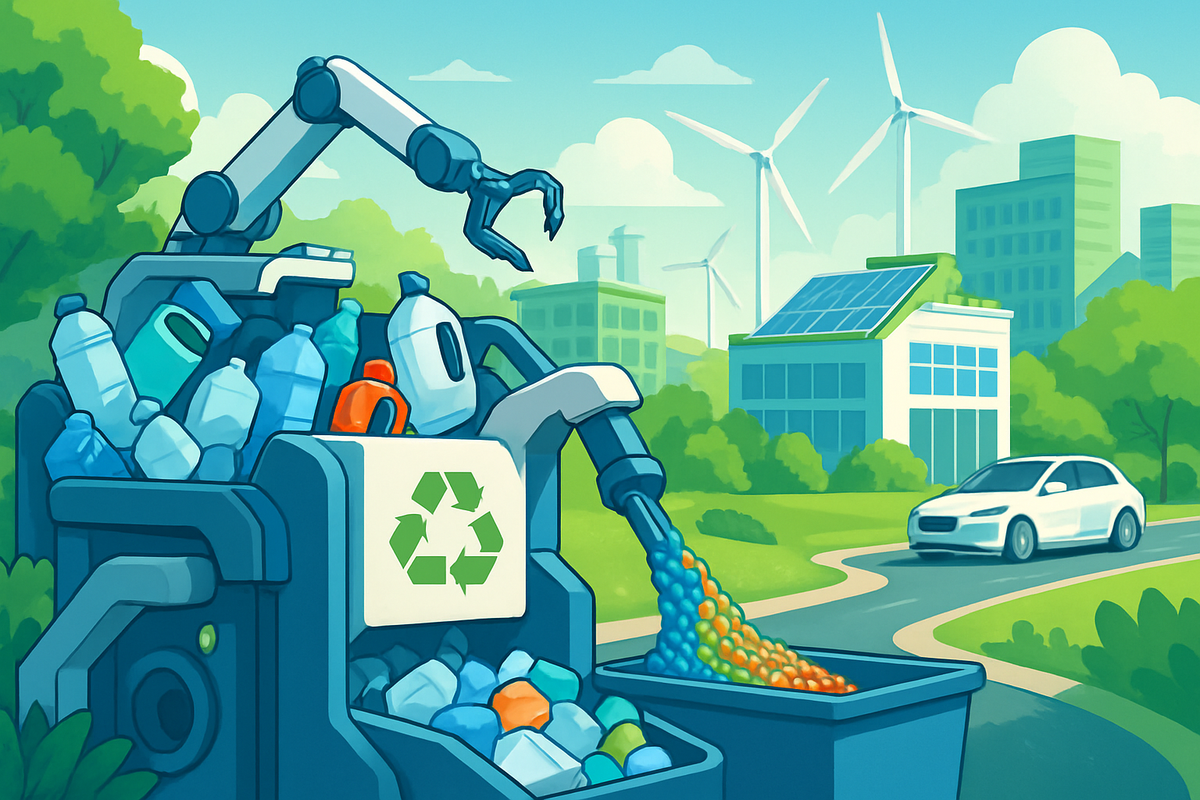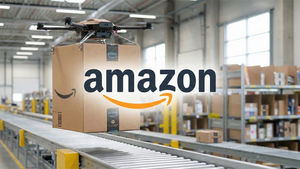
The global economy is undergoing a profound transformation, with sustainable and green industries emerging as powerful engines of growth and innovation. At the forefront of this green tidal wave is the Recycled Plastic Market, projected to expand dramatically, reaching an impressive US$ 132.55 billion by 2035 with a robust Compound Annual Growth Rate (CAGR) of 8.25% from 2025. This significant expansion is not merely an environmental imperative but a burgeoning economic opportunity, reshaping supply chains, driving technological advancements, and redefining corporate strategies across the globe. As of October 7, 2025, this projection underscores a clear and accelerating shift towards a circular economy, signaling a future where waste is increasingly viewed as a valuable resource.
This surging growth reflects a confluence of factors: heightened global environmental consciousness, increasingly stringent regulatory frameworks, ambitious corporate sustainability commitments, and groundbreaking technological innovations in recycling. The implications are far-reaching, promising a future with reduced reliance on virgin plastics, lower carbon footprints, and a more resilient, resource-efficient economic model. Investors, policymakers, and consumers alike are taking note, recognizing the profound long-term impact of this green industrial revolution.
Unpacking the Plastic Transformation: Drivers and Key Players
The projected growth of the Recycled Plastic Market from an estimated US$ 55.46 billion in 2024 to US$ 132.55 billion by 2035 is a testament to the industry's rapid evolution. This remarkable trajectory is being fueled by several critical drivers that have gained significant momentum in recent years. Firstly, consumer demand for sustainable products has never been stronger. A globally aware populace is actively seeking brands that demonstrate environmental responsibility, with products featuring recycled packaging often perceived as more eco-friendly. This shift in purchasing behavior directly influences corporate strategies, compelling businesses to integrate greener practices.
Secondly, regulatory pressures are intensifying worldwide. Governments are implementing stringent measures to combat plastic pollution, including bans on single-use plastics, the introduction of Extended Producer Responsibility (EPR) schemes, and the establishment of ambitious recycling targets. For instance, the European Union (EU) aims for 55% plastic recycling by 2025, and various regions are mandating minimum recycled content in plastic products. These policies create a powerful incentive, and in some cases, a legal obligation, for industries to incorporate more recycled materials.
Thirdly, major corporate sustainability goals are playing a pivotal role. Public companies like Coca-Cola (NYSE: KO), Unilever (NYSE: UL), and Nestlé (SWX: NESN) have made significant commitments to use a high percentage of recycled plastic in their packaging by 2030, with some aiming for 100% recyclable packaging even sooner. These commitments are driven by a desire to meet tightening Environmental, Social, and Governance (ESG) standards, enhance brand reputation, and secure regulatory compliance.
Finally, technological advancements are revolutionizing the recycling landscape. Innovations in advanced mechanical recycling and chemical recycling methods, such such as pyrolysis and depolymerization, are improving material recovery rates and expanding the types of plastics that can be effectively recycled, including mixed and contaminated streams. AI-powered sorting systems are further enhancing efficiency, making the process more cost-effective and yielding higher-quality recycled materials that can compete with virgin plastics.
Key players in this transforming market include waste management giants like Veolia (EPA: VIE) and Suez SA (EPA: SZE), as well as specialized recycling and polymer companies such as Indorama Ventures Public Company Limited (BKK: IVL), Far Eastern New Century Corporation (TPE: 1402), and Alpek S.A.B. de C.V. (BMV: ALPEKA). Other significant players include Berry Global Inc. (NYSE: BERY), Plastipak Holdings, Inc., and KW Plastics. These companies are actively investing in infrastructure, R&D, and partnerships to scale their operations and meet the escalating demand for recycled content.
Winners and Losers: Corporate Fortunes in a Circular Economy
The surging growth in the recycled plastic market is creating a clear delineation between companies poised for significant gains and those facing considerable headwinds. This trend is compelling businesses across industries to re-evaluate their operational models and strategic priorities.
Companies that stand to win are primarily those directly involved in the recycling value chain or those strategically integrating recycled content into their products. Waste management and recycling companies like Republic Services, Inc. (NYSE: RSG) and Waste Management, Inc. (NYSE: WM) are at the forefront, benefiting from increased demand for their collection, sorting, and processing services. Their investments in advanced recycling technologies, including chemical recycling and AI-driven sorting, are enhancing efficiency and securing crucial feedstock supply chains. These companies are strengthening their market positioning as essential enablers of the circular economy.
Chemical companies pivoting to advanced recycling are also emerging as significant winners. Historically focused on virgin plastic production, firms such as LyondellBasell Industries (NYSE: LYB) and Dow (NYSE: DOW) are now strategically investing in chemical recycling. This allows them to break down plastic waste into its molecular components, creating "virgin-quality" feedstocks for new plastics, even for food-grade applications. This diversification reduces reliance on fossil fuels, aligns with sustainability goals, and taps into new profit pools by producing high-quality recycled materials that meet stringent industry requirements.
Consumer brands and Fast-Moving Consumer Goods (FMCG) companies are under immense pressure from consumers and regulators to adopt sustainable packaging. Giants like PepsiCo (NASDAQ: PEP), Procter & Gamble (NYSE: PG), and Adidas (ETR: ADS) are committing to substantial increases in recycled content in their products and packaging. Incorporating Post-Consumer Recycled (PCR) plastic enhances brand reputation, fosters customer loyalty among eco-conscious consumers, and ensures compliance with regulations like Extended Producer Responsibility (EPR) schemes. These companies are also redesigning products for easier recyclability and investing in closed-loop systems. Packaging manufacturers that adapt their production to utilize recycled plastics, such as Scandolara and Ramson Packaging, will thrive by offering eco-friendly alternatives.
Conversely, companies that might face challenges are those heavily reliant on traditional, virgin plastic production without a clear strategy for transitioning to sustainable alternatives. Virgin plastic producers, typically large petrochemical companies, face a long-term threat to their market dominance. Increased availability and demand for recycled plastics can lead to an oversupply of fossil-based virgin plastics, potentially depressing prices and eroding profit margins. These companies are under pressure to either pivot into advanced recycling or risk losing market share. Smaller, regionally focused recycling operations or those heavily reliant on exports may also struggle with inconsistent quality, higher processing costs, and a lack of standardized infrastructure, making it difficult to compete without significant capital investment in advanced technologies. Manufacturers across various industries that are unwilling or unable to integrate recycled plastics into their products risk being perceived as environmentally irresponsible, losing market share, and facing penalties from regulations mandating recycled content.
Broader Ripples: Circular Economy, ESG, and Policy Shifts
The surging growth in sustainable and green industries, with the recycled plastic market as a prime example, signifies a fundamental paradigm shift with profound wider significance. This trend is deeply intertwined with the broader adoption of the circular economy model, which aims to keep resources in use for as long as possible, extracting maximum value and then recovering and regenerating materials. Plastic recycling directly reduces dependence on virgin raw materials, minimizes pressure on ecosystems, and contributes to economic stability by lessening volatility associated with fossil fuel prices. It fundamentally transforms the plastic value chain from a linear "make-use-dispose" model to one where waste becomes a valuable resource.
This shift is also inextricably linked to the rise of ESG (Environmental, Social, and Governance) investing. ESG factors have become a critical lens through which investors assess a company's sustainability performance and long-term financial health. Companies that actively address their plastic footprint through recycling initiatives and integrate ESG principles into their operations are more attractive to shareholders and increasingly seen as lower-risk investments. Conversely, investments in traditional, virgin plastic production are increasingly viewed as potential stranded assets in a world transitioning to a circular economy. Strong ESG performance, supported by measurable metrics and alignment with Sustainable Development Goals (SDGs), enhances corporate reputation and strengthens supply chains.
The ripple effects on competitors and partners are substantial. Companies embracing green practices gain a distinct competitive advantage, improving brand image and attracting eco-conscious consumers. Those failing to adapt risk being left behind, facing reduced demand for traditional products and increased costs. This environment necessitates stronger collaboration across the value chain. Companies like Unilever (NYSE: UL) are working closely with suppliers to improve sustainability practices. Developing robust local and regional supply chains for recycled materials requires partnerships between waste management companies, chemical producers, consumer brands, and even research institutions to create efficient closed-loop systems.
Regulatory and policy implications are a major catalyst for this transformation. Governments worldwide are implementing stringent regulations to curb plastic pollution and promote recycling. This includes widespread plastic bans on single-use items in many jurisdictions (e.g., California's requirement for a 25% reduction in single-use plastics by 2032, the EU's Single-Use Plastics Directive). More significantly, recycling mandates are becoming commonplace. Post-consumer recycled (PCR) content mandates require a minimum percentage of recycled material in plastic products, with California, for example, mandating 50% recycled content in plastic beverage containers by 2030. Extended Producer Responsibility (EPR) laws are also shifting the financial and operational burden of recycling onto producers, incentivizing packaging redesign for recyclability. These regulations compel manufacturers to adapt their packaging, share costs, and engage with recycling organizations.
Historically, this "green industrial revolution" mirrors past industrial transformations. Just as the First and Second Industrial Revolutions were driven by technological breakthroughs (steam power, electricity) and infrastructure development, leading to profound economic reorganizations, the current shift is propelled by green technology and sustainable practices. While past revolutions often came with significant environmental costs, the current movement aims to build upon principles of efficiency and integrated systems while actively mitigating environmental impact. The adaptive reuse of industrial buildings, a sustainable practice of repurposing existing infrastructure, provides a historical precedent for how societies can creatively address resource use and sustainability concerns.
The Road Ahead: Opportunities, Challenges, and Strategic Pivots
Looking ahead, the recycled plastic market and the broader green industries are set for continued, dynamic evolution, presenting both significant opportunities and persistent challenges. In the short term (next 1-3 years), the recycled plastic market will continue to be driven by escalating regulatory pressures, such as the increasing implementation of EPR schemes and recycled content mandates across North America, Europe, and Asia. Corporate commitments to sustainability will remain a strong demand driver. However, challenges like the price disparity between recycled and virgin plastics (especially when crude oil prices are low), and the shortage of high-quality feedstock due to inefficient collection and sorting, will need to be addressed. The green economy as a whole will navigate supply chain disruptions and policy uncertainties in some regions.
In the long term (5-10+ years), the outlook is overwhelmingly positive. The recycled plastic market is projected to reach well over US$ 120 billion by 2030, with a strong CAGR continuing beyond. A key long-term trend is the full embrace of the circular economy, extending the lifecycle of plastics through advanced recycling. This includes the integration of bioplastics with recycled plastics to create hybrid sustainable materials. Chemical recycling capacity is projected to grow significantly, enabling higher-quality outputs suitable for a wider range of applications, including food-grade packaging. Beyond packaging, recycled plastics will increasingly find their way into demanding sectors like automotive, electronics, and construction. For the broader green industries, the long-term future is shaped by the imperative to decouple economic growth from environmental degradation. Continuous technological advancements in renewable energy, energy storage, smart grids, and sustainable materials science will unlock new possibilities, with the green technology market itself forecasted to reach tens of billions by 2030, propelled by AI and ESG compliance.
Strategic pivots and adaptations will be crucial for companies to thrive. This includes:
- Embracing Technological Innovation: Investing in advanced recycling technologies (chemical, enzymatic, AI-driven sorting) to improve efficiency and material recovery.
- Vertical Integration and Supply Chain Optimization: Controlling more of the supply chain from collection to processing, and formalizing informal recycling chains to secure reliable feedstock.
- Adopting Circular Economy Business Models: Designing products for durability, repair, and recyclability, shifting away from linear models.
- Strengthening Collaboration and Partnerships: Building robust partnerships across the value chain, from waste collectors to brand owners, to create efficient closed-loop systems.
- Navigating Regulatory Landscapes and Policy Advocacy: Proactively adapting to evolving regulations and engaging with policymakers to ensure supportive legislation.
- Focus on Measurable Sustainability and Transparency: Implementing clear sustainability strategies and transparent reporting to build trust and avoid "greenwashing."
- Talent Development: Investing in training and education to meet the demand for new skills in the green economy.
Emerging market opportunities are particularly compelling. Developing economies are projected to account for over half the growth in global plastic waste by 2060, presenting significant investment opportunities for recyclers. In many of these markets, clean technologies are already more cost-competitive than traditional carbon-intensive alternatives, offering "green discounts" to consumers and fueling new green investments. This provides a unique chance for developing countries to leapfrog polluting industries and build sustainable economic foundations.
However, significant challenges remain. A major hurdle in the recycled plastic market is the shortage of suitable feedstock and quality gaps, with much collected plastic lost due to improper sorting or contamination. Price volatility and disparity with virgin plastics can deter investment. High initial investment costs for green technologies and infrastructure, coupled with policy inconsistencies and regulatory uncertainty, can slow adoption. A skills mismatch between existing labor forces and the demands of the green economy also needs to be addressed.
Potential scenarios range from an accelerated circular economy (optimistic, driven by strong regulations, investment, and technological breakthroughs), to a stagnated transition (moderate, where challenges persist and growth slows), or even fragmented and localized growth (where strong growth in some regions contrasts with lags in others). The overarching trend, however, indicates an undeniable and necessary shift towards greener practices, with proactive adaptation, innovation, and collaboration being key to success.
The Green Horizon: A Sustainable Future Takes Shape
The surging growth in global sustainable and green industries, powerfully exemplified by the projected expansion of the Recycled Plastic Market to US$ 132.55 billion by 2035, represents one of the most significant economic transformations of our time. This shift is not a fleeting trend but a fundamental reorientation towards a more resource-efficient, environmentally conscious, and economically resilient future.
Key takeaways underscore that this growth is driven by a powerful synergy of consumer demand, stringent regulatory mandates (such as EPR schemes and recycled content requirements), ambitious corporate sustainability goals, and revolutionary advancements in recycling and green technologies. The market for recycled plastics is no longer a niche segment but a critical component of mainstream manufacturing, with packaging, automotive, and construction sectors increasingly relying on these sustainable materials.
Moving forward, the market is poised for continued robust expansion, driven by accelerating circular economy initiatives and persistent demand for sustainable solutions. The development of advanced recycling technologies, particularly chemical recycling, will be pivotal in overcoming current limitations related to quality and contamination, allowing for higher-grade recycled materials suitable for a wider array of applications. Furthermore, the global push for localized recycling solutions and diversified supply chains will enhance resilience and reduce reliance on volatile international markets.
For investors in the coming months, vigilance and strategic insight will be paramount. Key areas to watch include:
- Policy and Regulatory Developments: Keep a close eye on new or strengthening EPR laws and PCR content mandates globally, as these directly stimulate demand for recycled plastics.
- Technological Innovation: Investigate companies at the forefront of advanced recycling technologies (chemical, enzymatic, AI-driven sorting) and those investing in improved collection and processing infrastructure.
- Corporate Commitments and Partnerships: Favor companies with strong, verifiable commitments to using recycled content and those forming strategic alliances across the value chain.
- "Green Premium": Monitor the price difference between recycled and virgin plastics, as a steady or rising "green premium" for high-quality recycled materials signals a healthier market for recyclers.
- ESG Integration: Prioritize companies with strong ESG practices, as these are generally more resilient to regulatory changes, supply chain disruptions, and shifting consumer preferences, leading to enhanced long-term returns and lower risk profiles.
- Diversification: Consider companies involved in recycling a range of plastic types (PET, HDPE, PP) and serving diverse end-use industries beyond just packaging.
In essence, the green horizon is rapidly taking shape, promising a landscape where economic growth and environmental stewardship are not mutually exclusive but deeply intertwined. Investors who proactively understand these dynamics and strategically allocate capital to innovative and well-positioned players stand to benefit significantly from the ongoing transformation towards a more circular and sustainable global economy.
This content is intended for informational purposes only and is not financial advice





